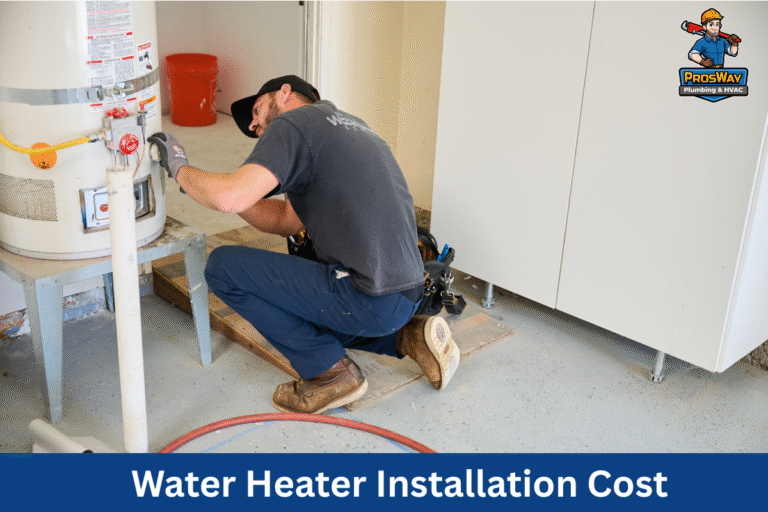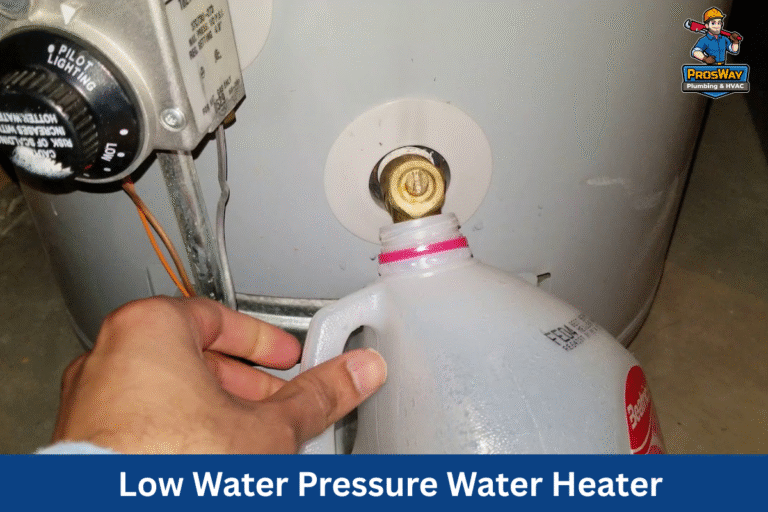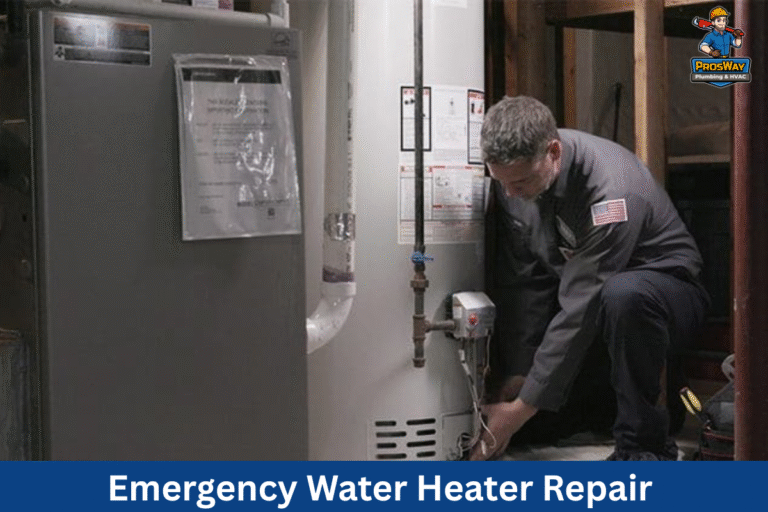Dealing with frequent drain clogs can be frustrating and costly. However, with the right preventative measures, you can prevent future drain clogs before they start. Simple strategies like regular drain maintenance, proper disposal habits, and investing in high-quality drain covers can go a long way in keeping your pipes clear.
This guide will help you implement effective maintenance habits, educate household members on drain safety, and recognize early warning signs of potential clogs. At ProsWay Plumbing & HVAC, we provide expert plumbing services to help homeowners maintain their drainage systems efficiently.
Key Takeaways
- Regular drain maintenance helps prevent future drain clogs and keeps pipes in top condition.
- Proper waste disposal stops grease, food scraps, and hygiene products from clogging drains.
- Using drain covers and strainers blocks debris and reduces the risk of blockages.
- Simple plumbing habits like running hot water and using enzyme-based cleaners improve drain performance.
- Spotting early signs like slow drainage and gurgling sounds can prevent costly repairs.
How Can Routine Maintenance Prevent Drain Issues?

Preventing clogs starts with consistent maintenance. Simple habits like regular inspections and flushing your drains with hot water can make a big difference.
| Maintenance Task | Frequency | Purpose |
| Drain Inspections | Annually | Detects hidden clogs and pipe damage. |
| Enzyme-Based Cleaners | Monthly | Break down organic buildup safely. |
| Hot Water Flushing | Weekly | Dissolve grease and soap residue. |
| Drain Cover Cleaning | Biweekly | Prevent debris from entering pipes. |
| Checking for Leaks | Every 6 months | Identify and repair small issues early. |
Why Should You Schedule Routine Plumbing Inspections?
Routine drain inspections help detect issues before they worsen. A professional plumber can identify early signs of blockage, damaged pipes, or tree root intrusion, which can cause long-term damage.
Use Enzyme-Based Cleaners for Monthly Drain Upkeep
Using enzyme-based drain cleaners once a month is an effective way to break down organic buildup like grease, soap scum, and food particles.
Unlike harsh chemical drain cleaners, enzyme-based solutions are safe for pipes and help keep your drains clear naturally.
Learn What Natural Ingredients Clear Drain Clogs Effectively.
How Does Flushing Drain With Hot Water Help?
Pouring hot water down your drains weekly helps dissolve grease and soap residue, preventing buildup. This method works especially well in kitchen sinks, where cooking oils tend to solidify and cause blockages.
Inspect and Replace Damaged Pipes Promptly
Old or damaged pipes can lead to slow drainage and recurring clogs. If you notice rust, leaks, or persistent blockages, replace sections of your plumbing system to maintain smooth water flow.
Can Tree Roots Invade Your Plumbing System?
Yes! Tree roots can grow into underground pipes, causing major blockages and even pipe damage. If you experience frequent backups, a sewer line inspection can determine if roots are the problem.
Keep Records of Maintenance Activities for Reference
Tracking past plumbing maintenance and repairs helps identify patterns in your drainage issues. Keeping a log can assist in the early detection of recurring problems before they turn into major repairs.
How Can Educating Household Members Help Prevent Clogs?
Many clogs are preventable with proper waste disposal habits. Teaching everyone in the household what should and shouldn’t go down the drain can significantly reduce plumbing issues.
Find out what to do when you have a clogged drain.
Why Should You Avoid Using Harsh Chemicals?
Chemical drain cleaners may offer quick fixes, but they corrode pipes over time, leading to expensive plumbing repairs. Opt for natural drain cleaning solutions like baking soda, vinegar, and enzyme-based products.
What Items Should Never Be Flushed or Washed Down the Drain?
Avoid flushing or rinsing the following items down the drain:
- Grease, fats, and oils
- Coffee grounds and food scraps
- Wet wipes, paper towels, and feminine hygiene products
- Hair and soap scum buildup in bathroom sinks and tubs
Set Guidelines for Food Waste Disposal in Sinks
Scraping food scraps into the trash or compost instead of rinsing them down the sink prevents drain buildup and reduces the risk of kitchen sink clogs.
Encourage the Use of Strainers in Shower and Sink Drains
Installing drain strainers in sinks, tubs, and showers helps catch hair, food particles, and other debris before they enter the pipes. Regularly cleaning strainers prevents buildup and keeps drains flowing smoothly.
Teach Children About Drain Safety and Proper Usage
Young children often flush toys, wipes, or excessive toilet paper down the toilet, leading to blockages.
Teaching them to use drains responsibly and reminding them what belongs in the trash instead of the sink or toilet can prevent unnecessary plumbing problems.
Why Are Drain Covers and Screens Essential?

What Type of Drain Covers Work Best?
Mesh drain covers effectively trap debris like hair and food particles before they enter the pipes. Investing in high-quality covers helps prevent frequent clogged drains.
How Often Should Drain Covers Be Inspected for Damage?
Old or worn-out drain covers may not function properly. Replacing them when necessary ensures they continue protecting your pipes from clogs.
Clean and Maintain Drain Covers to Prevent Clogs
Regularly cleaning drain covers removes trapped debris and helps maintain smooth water flow.
Do Different Drains Need Different Covers?
Some covers are designed specifically for catching hair, while others are better for blocking food particles. Choosing the right one for each sink or tub can significantly reduce the risk of clogs.
Why Is a Snug Fit Important for Drain Covers?
Drain covers should fit securely over drains to be effective. If there are gaps, debris can bypass the cover, leading to blockages.
Replace Old or Ineffective Covers as Needed
Over time, drain covers may become less effective. Replacing them when they show signs of wear ensures they continue to protect your pipes.
What Plumbing Habits Can Help Prevent Drain Clogs?
Daily habits play a significant role in maintaining a clog-free plumbing system. Being conscious of what goes down the drain can prevent blockages and extend the lifespan of your pipes.
Small adjustments, like proper waste disposal and checking for leaks, can help you avoid costly plumbing repairs in the long run.
Watch this video for essential tips on preventing drain clogs: How to Prevent Clogged Drains?
Why Should You Never Pour Grease or Oil Down the Drain?
Grease, fats, and oils may seem harmless in liquid form, but they solidify as they cool, sticking to the inner walls of your pipes.
Over time, this buildup narrows the pipe opening, leading to slow drainage and major clogs. Instead of pouring grease down the sink, let it cool in a container and dispose of it in the trash.
How Does Rinsing Dishes Before Washing Help?
Even small bits of food can gather in your pipes, creating blockages over time. Grinding plates into the trash or compost before washing reduces the risk of clogs.
For added protection, use a sink strainer to catch small food particles before they reach your plumbing system.
Limit the Use of Toilet Paper and Feminine Hygiene Products
Excessive toilet paper usage can overwhelm your drainage system, especially in homes with older pipes.
Additionally, feminine hygiene products, wipes, and paper towels should never be flushed, as they don’t break down easily and can cause serious plumbing issues. Always dispose of these items in a waste bin instead of the toilet.
| Item | Can It Go Down the Drain? | Reason |
| Grease & Cooking Oil | No | Hardens in pipes and causes clogs. |
| Coffee Grounds | No | Forms clumps that block pipes. |
| Food Scraps | No | Buildup can clog kitchen drains. |
| Feminine Hygiene Products | No | Do not break down in water. |
| Flushable Wipes | No | Often they do not dissolve properly. |
| Small Amount of Toilet Paper | Yes | Dissolves in water but should be used in moderation. |
Run Water While Using the Garbage Disposal for Efficiency
Garbage disposals can handle small amounts of food waste, but they need proper water flow to function effectively.
Running cold water while using the disposal helps flush the waste down smoothly and prevents food particles from sticking to the pipes.
After using the disposal, let the water run for a few extra seconds to ensure all debris is washed away.
Why Should You Dispose of Coffee Grounds and Food Scraps Properly?
Coffee grounds and fibrous food scraps (like celery, potato peels, and pasta) can easily clog pipes by forming dense clumps that don’t dissolve in water.
Instead of rinsing them down the sink, dispose of them in the trash or compost. This simple step can help keep your kitchen drains flowing freely.
Why Is Checking Appliances for Leaks Important?
Leaks from dishwashers, washing machines, and refrigerators can introduce excess water into your plumbing system, leading to moisture buildup and potential pipe damage.
Regularly checking appliances for leaks ensures that water flows properly and prevents unnecessary strain on your drains.
If you notice water pooling around any appliances, it may be time for professional plumbing repair.
How Can Upgrading Your Drainage System Improve Plumbing Performance?

Upgrading your home’s drainage system can improve water flow and reduce the likelihood of frequent clogs.
Choosing the right materials and ensuring proper installation will keep your plumbing system running efficiently for years.
Should You Upgrade to Wider Pipes for Better Flow?
Older homes often have narrow pipes that can’t handle modern water usage efficiently. Upgrading to wider pipes allows for better drainage and reduces the chances of blockages, particularly in high-use areas like kitchens and bathrooms.
Use PVC Piping for Durability and Ease of Maintenance
PVC pipes are an excellent option for modern plumbing systems. Unlike metal pipes, which can corrode and develop leaks over time, PVC is resistant to rust and buildup, making it a long-lasting and low-maintenance choice for drainpipes.
Check Local Codes for Drainage System Requirements
When upgrading your plumbing system, it’s important to follow local building codes to ensure compliance.
Regulations often specify pipe size, material, and drainage slope requirements. Checking with a licensed plumber before making changes can help you avoid costly mistakes.
| Pipe Material | Durability | Maintenance Required | Recommended Use |
| PVC Pipes | High | Low | Drain and sewer systems. |
| Copper Pipes | High | Moderate | Water supply lines. |
| Galvanized Steel | Moderate | High | Older homes, are prone to rust. |
| Cast Iron Pipes | High | High | Main sewer lines. |
Should You Hire a Professional for Plumbing Installations?
While some plumbing upgrades can be DIY-friendly, complex projects such as replacing pipes or installing new drainage systems are best left to professionals.
Expert installation ensures your system functions efficiently, meets building codes, and lasts longer.
Are Water-Efficient Fixtures a Good Investment?
Installing water-efficient faucets, showerheads, and toilets can reduce strain on your plumbing system.
Low-flow fixtures use less water per flush or use, preventing unnecessary buildup and reducing the risk of excessive water waste and drain overload.
Why Is Proper Pipe Slope Important for Drainage?
The angle at which pipes are installed affects how well water drains. Pipes that are too flat can cause water and debris to settle, leading to slow drainage and clogs.
Properly sloped pipes allow waste to flow smoothly, preventing backups and improving the efficiency of your entire plumbing system.
Need Help Upgrading Your Plumbing System? Call ProsWay Today!
If you’re experiencing frequent drain issues or need to upgrade your drainage system, ProsWay Plumbing & HVAC is here to help. We also provide expert plumbing installation services to keep your home’s plumbing in top condition. Call us now at (862) 260-5870 or Book Online for professional plumbing solutions today!








